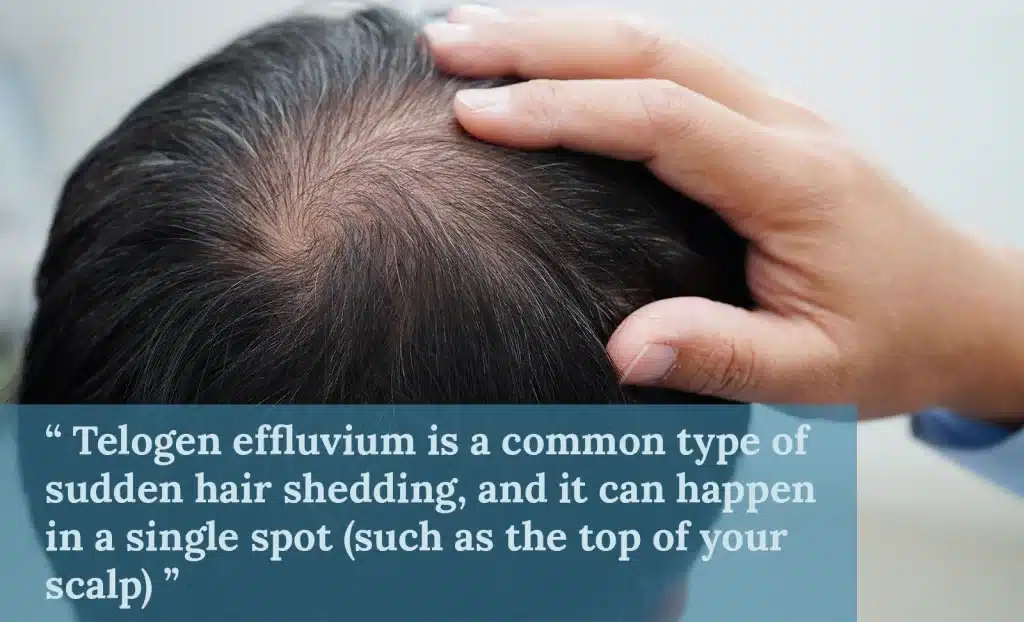When taking any new medication, you have a myriad of potential side effects to contend with. Sometimes, these side effects are mild and/or rare, meaning you don’t have to worry so much. Other times, the potential effects can have a seriously negative impact, whether that’s on your physical or mental health.
If you have been prescribed amitriptyline by your doctor, you may worry about the negatives outweighing the positives, especially when it comes to your locks. In this article, find out everything you need to know about amitriptyline’s effect on hair loss.
What is Amitriptyline?
First, let’s understand what amitriptyline actually is and what it is used for. Amitriptyline is a prescription-only tricyclic antidepressant commonly prescribed to treat mental health conditions such as depression. It is also sometimes prescribed as a pain killer, particularly for those experiencing frequent and severe migraines.
Amitriptyline works by increasing the brain’s serotonin production, and it usually takes a few weeks for results. When prescribed for pain, only a low dose of the medication is needed – for depression or anxiety, doctors prescribe a higher dose of amitriptyline.
Does Amitriptyline Cause Hair Loss?
In some cases, yes – amitriptyline and hair loss are linked. However, it is very rare, with hair loss only occurring in 1 in 1000 cases. [1] So, while it can happen, it’s unlikely – if you have been prescribed amitriptyline by your doctor, there will be a good reason why you need it, so don’t let the minute chance of hair thinning stop you from taking the medication that may help you reduce pain or treat a mental health disorder.
Why Does Amitriptyline Cause Hair Loss?
The reason behind amitriptyline hair loss is due to telogen effluvium, a type of hair loss that occurs when the body is under stress – taking amitriptyline can trigger this.
Telogen effluvium [2] is a common type of sudden hair shedding, and it can happen in a single spot (such as the top of your scalp) or all over your head, potentially even affecting body hair.
Is Amitriptyline Hair Loss Reversible?
Yes! The good news is that amitriptyline hair loss is typically not permanent, as telogen effluvium is only a temporary type of hair loss. For most patients, hair starts to grow back within a matter of months.
What to Do If You’ve Experienced Amitriptyline Hair Loss
Have you experienced hair loss after taking amitriptyline? It’s best not to panic, as there are steps you can take to help your hair grow back.
Speak to Your Doctor
First things first, you should speak to your doctor. Your doctor will want to know about any side effects you experience from the medication, so book an appointment if hair loss is one of them. They will be able to help you determine whether your hair loss is caused by amitriptyline or if something else is the cause. Your doctor may also help you find a good hair restoration treatment to help you regrow your locks.
Use Hair Loss Treatments
You don’t always need a doctor for a good hair loss treatment. There are several hair restoration options available – minoxidil is a good non-prescriptive one. You can get it over the counter and it works well for both men and women, so if you have experienced hair loss, it can help you regrow a full head of hair. Other treatments are prescription only, such as finasteride, which is prescribed only for men.
There are other hair restoration options that are not medications, such as some hair oils. For example, there is evidence that both pumpkin seed oil and rosemary oil are effective as hair growth treatments, so they may be worth using if you’ve only experienced slight hair thinning.
Manage Stress
Telogen effluvium – the type of hair loss caused by amitriptyline – is triggered by stress, which targets the hair follicles and causes the hair to shed. To help your hair grow back, you should manage stress as much as possible. That doesn’t necessarily mean stopping amitriptyline, as hair loss may only be an early side effect, and taking the medication may help you reduce stress and anxiety in the long term. Other ways to reduce stress include exercising, managing a good work-life balance, socialising with friends and family, getting outside, and taking time for a hobby you genuinely enjoy.
Eat Well
There is a definite link between diet and telogen effluvium, which means you can manage this type of hair loss by eating a diet rich in all the nutrients your body needs. Focus particularly on consuming plenty of protein, vitamins A, B, C, and E, iron, and zinc to reduce hair loss.
Other Side Effects from Amitriptyline
Hair loss is not the only side effect of amitriptyline – it’s just one very rare side effect; many others are more likely to occur. If you’re taking amitriptyline, these are the other side effects to be aware of:
- Headaches
- Constipation
- Dizziness
- Sleepiness
- Urination Problems
- Dry Mouth
- Weight Gain
- Appetite Changes
These side effects (above) are typically mild and not too serious. Other side effects are more serious and require urgent medical attention – contact a medical professional if you experience any of the following side effects:
- Changes to Heart Rhythm
- A Skin Rash
- Swelling
- High Fever
- Changes to Vision
- Thoughts of Suicide
Should You Take a Different Medication?
If you experience hair loss or one of the other side effects of amitriptyline, you may wonder whether switching to a different medication is the best next step. Everyone is different, and it’s important to speak to your doctor before starting or stopping any medication, so book an appointment. You might find that switching from a higher dose to a lower dose works better for you or that amitriptyline simply isn’t the medication you should be taking.
It’s important to note that not everyone should take amitriptyline. Some medications should not be taken alongside this antidepressant medication due to drug interactions – for example, those who take droperidol, linezolid, or phenothiazines should not take amitriptyline. Also, certain illnesses and conditions may mean you cannot take the medication, such as pregnancy, asthma, glaucoma, thyroid problems, and heart disease.
Is Your Hair Loss Caused by Something Else?
Amitriptyline hair loss is not very common. Due to this, there’s a high chance your hair loss is caused by something else. Here are some other common causes of hair loss:
Male or Female Pattern Hair Loss
Male or female pattern hair loss – also known as androgenetic alopecia – is the most common type of hair loss. It’s more common in men but can affect anyone. It’s all due to genetics, so you are more likely to experience androgenetic alopecia if you have a parent who has experienced hair loss.
Hormonal Changes
There are several points in life where your hormones may change significantly, and that can cause hair loss. For example, hair loss is common during postpartum and menopause, and this is because of the changes to hormones – often, this type of hair loss is reversible.
Nutritional Deficiencies
Some nutritional deficiencies can lead to hair loss. In particular, iron, vitamin D, zinc, and biotin deficiencies may cause disruptions to the hair growth cycle, leading to the hair falling out. Luckily, treating this is typically simple and involves a change to the diet or taking a supplement – although, there may be an underlying cause causing the nutritional deficiency, so it’s always best to speak with your doctor.
If you do not know what is causing your hair loss, or you are looking for a treatment, it’s best to speak to a hair specialist or doctor, as this will get you on the right path. Do you want to talk to an expert in all things hair loss? Download our hair track app.
When is a Hair Transplant Necessary?
Amitriptyline hair loss typically does not lead to a hair transplant, as this type of hair loss is often temporary, and the hair will grow back without a surgical procedure. A hair transplant is best for those who have experienced male or female pattern baldness, as this is a more permanent type of hair loss that requires more intervention.
The FUE hair transplant is particularly effective at restoring hair growth, as it takes individual follicles from a healthy growth area and transplants them into the area of hair loss. Once these follicles take root, new, healthy hair can grow back through.
Can Amitriptyline Cause Hair Loss? Final Thoughts
Amitriptyline can cause hair loss, but it’s rare, so if you have a prescription for this antidepressant, don’t let this uncommon potential side effect put you off taking it – the chances are you won’t experience any hair loss! There are many other more common causes of hair loss, from male pattern baldness to nutritional deficiencies. If you need help determining the cause, speak to a medical professional.
If you have androgenetic alopecia and want to regain your confidence, you’re in the right place. Our hair restoration treatments have already helped many individuals regrow their hair, and you could be next – check out our patients gallery to see the work we do.
Sources:





